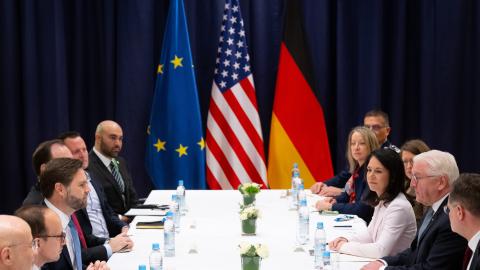Last week Vice President JD Vance told a group of outraged elites at the Munich Security Conference that European politicians must do a better job of responding to their voters’ concerns, rather than ignoring or censoring them.
Vance’s forceful rhetoric made good on President Trump’s promise to fight for the long-overlooked interests of ordinary citizens.
Nothing proved Vance’s point more to me this weekend than the gulf between the elite conference-goers and the regular Germans I chatted with.
Average Germans understand their nation is in crisis — and are exasperated that it took an American leader to say so.
Germany’s once-vaunted industrial prowess is a thing of the past: It trails even its European neighbors in fields from digital technology to rail infrastructure.
Layoffs in the auto industry, unthinkable 20 years ago, are now commonplace as over-regulation and an ideological obsession with green energy cause anemic economic growth.
Massive migration from Islamic countries since 2015 has created a dangerous domestic-security challenge. Women can no longer walk safely at night in cities.
Munich itself on the eve of the conference saw yet another act of Islamist terror: A 24-year-old illegal alien from Afghanistan drove a car into a crowd, killing two and wounding more than 30.
Immigration, by far, tops voter concerns heading into this Sunday’s Bundestag election.
In Trump’s first term, former Chancellor Angela Merkel was the face of the “global resistance” to his agenda.
Celebrated by the liberal media as the anti-Trump, it was Merkel and her aides who refused to build up Germany’s armed forces and who insisted on continuing the NordStream 2 pipeline, disparaging Trump’s complaints that it would send billions of dollars to Russia and endanger Ukraine.
During Trump 1.0, it was mostly taxi drivers — primarily immigrants from Turkey — who would tell me how much they admired President Trump.
As Germany’s decline has accelerated and as regular Germans increasingly feel their politicians have little sense of their problems or concerns, the hidden Trump “coalition” in Germany is expanding.
“My peers are jealous,” one German business leader told me. “We wish we had a Trump to reform government and get rid of waste and overregulation.”
A young woman told me, “I no longer take the subway alone at night.” Another told me she didn’t dare tell her parents when a young immigrant male “forcibly grabbed her and kissed her” when departing a streetcar.
A naive immigration policy has left them vulnerable, and they worry for the future of German society in the face of growing Islamist fundamentalism.
A college student told me he and his peers are concerned that a sclerotic German economy, overburdened by pensions and generous social programs, is harming their economic future.
It’s “hindering the kind of entrepreneurship and opportunity Trump will foster in the United States,” he said.
Polling consistently shows that Germans share the same concerns that Trump decisively won on.
Immigration and the economy are the two most pressing issues, according to a recent Deutschlandtrend survey.
Social disparity — both between rich and poor and among different cultural groups — also ranks high among concerns.
Plainly put, Germans are worried about the gap between wealthy elites and ordinary people, as well as a cultural gap with recent Muslim migrants.
If German officials heeded the concerns of these voters, a revitalized Germany would abandon the catastrophic course Merkel once charted.
Germany would become a security-oriented nation, internally and externally.
At home it would follow Trump’s example, stepping up policing and deporting illegal immigrants, especially those with criminal records and those who refuse to abide by the German constitution.
Abroad, as the continent’s largest nation, it would take responsibility for its own security and Europe’s as well. It is Germany’s task — not America’s — to build up the European pillar of NATO.
The media elites have been issuing apocalyptic warnings about the end of the transatlantic alliance.
But the truth is that the transatlantic alliance in its current iteration doesn’t address the needs of everyday Germans — or of American citizens, either.
Instead, it caters to the interests of progressive elites who think they can hide under the American security umbrella to pursue their agenda on energy, trade, social issues and immigration.
The alliance needs to undergo a radical shift: one focused on serving the interests of average citizens.
The Trump administration is issuing a warning — one that European leaders have ignored from their own people for far too long.
It’s time for them to follow Trump’s lead and ensure that our alliances work for the average citizen, not the elites in Brussels and Washington.




















